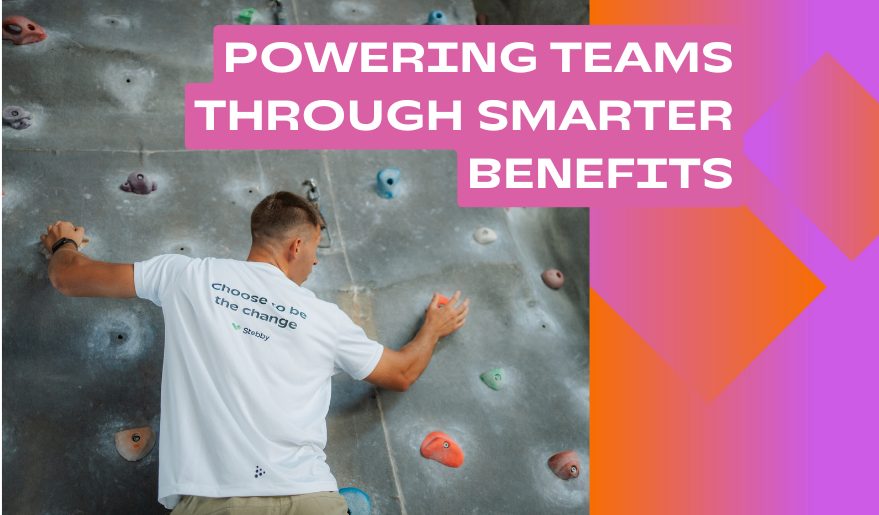Employee wellness is no longer just a perk, it’s a business priority. In Latvia, a new opportunity has opened up for companies to invest in their people more efficiently: the Personnel Sustainability Tax Exemption.
For comparison: raising salaries is significantly more expensive. For example, if an employer wants to give an employee an extra €50 “in hand”, the total cost for the company is more than €90 after taxes and social contributions. With Stebby and the Personnel Sustainability Tax Exemption, the employee still receives the same €50 value, but for the employer, it doesn’t grow nearly twice in size, making it a far more efficient way to invest in people.
What is the Personnel Sustainability Tax Exemption?
The Personnel Sustainability Tax Exemption is a corporate income tax (CIT) relief approved by the State Revenue Service (SRS) of Latvia. It allows companies to allocate up to 5% of their previous year’s gross salary expenses towards collective employee initiatives without creating additional tax obligations.
The purpose is simple: to strengthen teams through motivation, well-being, and collaboration measures. Unlike traditional benefits that are taxed as income for individuals, the exemption ensures that these investments remain tax-efficient and collective in nature .
Who can apply?
The exemption is broadly accessible. Private companies, public institutions, municipalities, and even subsidiaries or branches of foreign companies registered in Latvia can apply, provided they are subject to Latvian Corporate Income Tax (CIT).
There are no specific disqualifying conditions – companies simply need to be tax-compliant. Importantly, the benefit must be made available to all employees equally, whether local or foreign. It is not necessary for every employee to use it, but all must have the same opportunity to access it.
How is the 5% calculated?
The cap is tied to the gross salary expenses of the previous year, including regular salaries, bonuses, and one-off payments for which mandatory social security contributions have been made. Once set, the budget remains fixed for the year, regardless of employee turnover.
The 5% limit is applied to both employee sustainability and representation expenses , which must be tracked separately from other business costs.
Examples of qualifying sustainability expenses include:
-
Team-building events and cultural activities,
-
Sports, health, and wellness services available to all employees,
-
Shared social infrastructure (eg, facilities for dining, sports, or childcare).
Personalized expenses, such as an individual birthday gift, do not qualify under the exemption.
The cost of using a platform like Stebby is included within the 5% cap, as it directly relates to the administration of these benefits. Forgotten amounts cannot be rolled over to the next year.
Staying compliant
To maintain tax-exempt status, companies should follow key rules:
-
Equal access – the benefit must be transparent and non-discriminatory, available to all employees.
-
Proper documentation – companies should keep invoices from providers or platforms, but must not store individual-level usage data.
-
Employer–employee communication – while not legally mandatory, it’s recommended that companies issue a written announcement or internal policy explaining the purpose of these measures (team motivation, well-being, etc.). This shows the benefit is collective in nature and helps ensure compliance during potential audits.
If the 5% cap is exceeded or conditions are not respected, the expenses are treated as non-business-related and taxed under CIT, with possible penalties or late-payment interest for underreporting.
Why use Stebby?
While the framework is clear in principle, applying it in practice can be complex. That’s where Stebby comes in.
-
Aligned with SRS requirements – our platform is built to support the collective purpose of The Personnel Sustainability Tax Exemption.
-
Simple administration – one platform, one report, no scattered providers.
-
Budget efficiency – you pay only for what employees actually use.
-
Legal backing – our solution is developed in collaboration with Sorainen, ensuring both clarity and compliance.
Taking the next step
The Personnel Sustainability Tax Exemption is a unique opportunity for Latvian employers to strengthen motivation and well-being in a way that is both meaningful and cost-effective. Instead of spending heavily on salary increases that are quickly absorbed by taxes and contributions, employers can now channel the same budget into collective wellness measures that employees truly value.


